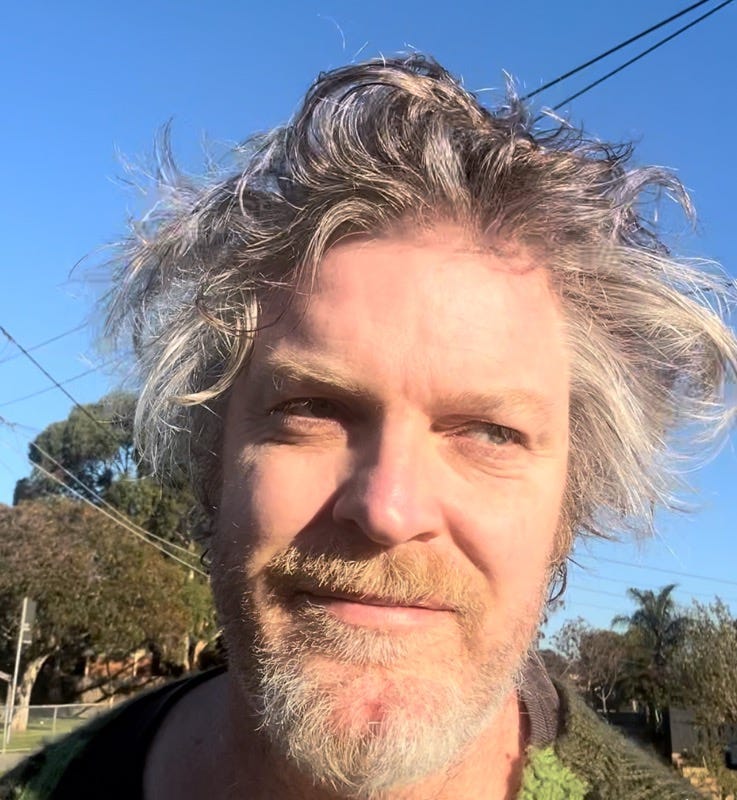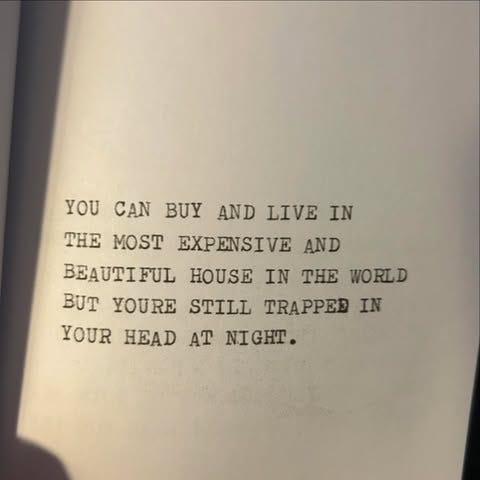Meet Darby Hudson, poet, iconoclast and inspirational cynic
"Having it figured out ruins creativity!"
Avoiding work can be quite motivating for poet Darby Hudson.
“Some of my favorite artists, their main motivation for doing their art, being a comedian, or whatever it was, they just didn't want to work. It's not that they had this crazy ‘I really want to be a creative person,’ it's just they didn't want to work, so they're running away from the job,” he says.
I’ve loved Darby’s poems, or “little word boxes” as he calls them for quite some time, so in February I asked him if he’d do an interview. He kindly agreed and last Monday night we had a lovely chat.
Darby is 49 years old and has lived in Melbourne his entire life. He has a “cliché backstory” of loving art since he was eight years old. He remembers photocopying his self-made books in primary school.
“Without meaning to sound fake modest, I've never been amazing at painting. I've never been amazing at writing. But I've always felt like I've had some solid ideas, I just didn't know how to express them. I've just tried different ways to express these ideas that I think are good,” he says.
He did an arts degree at Melbourne Uni in the 90s, and he’s still paying off his $40,000 worth of student loans. In his mid thirties he started copywriting for various agencies and businesses.
”I applied for every single job in a newspaper called The Age and with the piss take resume and that was at two and a half thousand jobs, from the bridge builder to the lawyer. The advertising jobs got that I was just taking the piss. And they said, ‘yeah you're a writer.’ And so I went, ‘okay I'll pretend that I am, yeah, and then I'll turn up,” he says.
He still doesn’t really think of himself as a writer, but he first felt confident that he could write when he was accepted into Best Australian Poems (Black Inc Books) in 2012 and again in 2013.
”I'd never written a poem before and (I’m guessing with hindsight) it was because I didn't know what I was doing or ‘how to write a poem’ I had ‘an advantage’. I submitted in later years but was rejected because I was then submitting stuff where I thought I had it ‘figured out’. Having it figured out ruins creativity! Then, I was just writing poems that were trying to sound like poems,” he says.
In his Blah Di Dah podcast he talks about rejecting whatever you get too comfortable with, pushing back, unlearning, starting over, and accepting your empty fate. His most popular stuff is about the banality and pointlessness of work, but he doesn’t want this to be his main bit. He loves cynicism. He advocates for chaos and for making mistakes. He curses; he talks about farts. He is very real.
Darby strikes me as extremely self aware. He knows his contemporary poetry won’t resonate with everyone, and he knows his modern methods will be judged in certain circles.
He struggles with grammar.
”Someone actually said on one of my posts the other day, ‘what's with the spelling mistakes and the clunky grammar?’ And I just said, ‘That's just how it comes out. I'm not going to try and correct it. It's just how it is.’”
He used to try to fix it, but now he’s at the point where he can say “fuck it.”
His latest book, You’re going to be okay (because you’re fucked no matter what) contains poems from the last ten years where he sat by a train station in Melbourne. He typed on an old typewriter, a gift from his ex.
He sat in the bushes. No one saw him except occasional train drivers. Some worried he was going to jump. Darby would reassure them he was just writing and reading.
”There was an embankment just by Rippponlea Train Station, which is about 200 meters down. I'd just go there after work. People have told me that's what is now called a third place. And I didn't even know it was called a ‘third place.’ I just needed a place between home and work. It felt like it was off the tracks of my loop of my life,” he says.
He loved that it was hidden-but-public, a natural space with people around. It felt like his own private universe, a spiritual place.
“It felt nice, and the dirt was beautiful,” he says.
He also stuck thousands of poems on poles throughout the Melbourne suburbs.
“It was a little bit self-promotion-y,” he admits. “It would have been really nice to have just left it nameless, and there would have been a purity to it. But it's like, no.”
From those pole poems musician Tim Rogers from the band You Am I found his words and then wrote a song about him.
Darby has caught the eye of a few Melbourne-based creatives. In 2019 he launched his first book with 5 Island Press from Melbourne University, and he invited Australian screen maker Adam Elliot to launch it, and to Darby’s surprise he said yes. Later Adam invited Darby to be his poet-in-resident on the set of his most recent film, Memoir of a Snail.
After the book launch, his career improved. At that point he had about 3,000 followers on Instagram. The University took a large portion of the book’s profit, and Darby decided he was going to start self publishing. He started posting one minute videos of his poems on social media after being prompted by the TikTok algorithm to do so. Before that he had just been posting his short word memes.
”I'll write one one minute story and see what happens. Because I don't want to work in a corporation. I don't want to be a copywriter. I don't want to work in teams of people,” Darby says.
It worked for him. He started gaining followers.
He was able to make the meekest living after he reached 10,000 followers. At that point he was also working in marketing at KMART. It started to get easier at 30,000 followers.
Now he has more than 60,000 followers on TikTok and more than 160,000 on Instagram. He makes more money from his book sales than he did at KMart. Sometimes he worries what might happen if Instagram and social media shuts down and he’ll have to go back to work again.
The blurbs he writes in his books are easily consumed and sell well. He described them as chewing gum for the brain.
“I love chewing gum for the brain, but I also love something that you can fall into a trance and casts a bit of a spell. I like the idea that maybe a book is just one single whole poem made up of a whole lot of love. Even though they are little bit mnemonic, witticisms, if you just read the whole thing through, it could just be one long poem,” he says.
He enjoys poets like Mary Oliver and Billy Collins, and he loves the classics.
”About six years ago, I went through a phase, and I read about 30 to 40 so-called classic novels that I'd never read. I almost took it as studying them and I’d dog tag pages and highlight stuff. And of each classic novel, for me personally, there are about maybe six to 10 paragraphs in a 300-page book that was actually brilliant. Those classic novels should have been reduced to six paragraphs,” he says.
Now when he writes, he aims to capture six brilliant paragraphs. He predicts his next book will be for those with a slightly longer attention span.
For someone with such cynicism, he’s somehow also refreshingly optimistic about his art.
”It's really possible to be making a living. I know money doesn't really matter. All it does is buy me time to do what I love doing, which is what I was doing anyway. It does sometimes feel like a big ‘fuck you’ to my past, stupid, meaningless jobs. But it is crazy. It's possible. It's real, it feels possible. It's more possible than people maybe imagine,” he says.
Good luck with it all, Darby! I hope to stumble into you in person someday! Ideally you’ll be plastering poems on poles, or typing word boxes up in the bush or rambling in the rain.
PS. Darby’s shameless self promotion has inspired me to tell my Newcastle-based readers I’ll be doing my own set of poems on March 20th at The Press Bookhouse. The night is free, and if it goes well I’ll do it again. Who knows maybe I’ll take it on the road or find a typewriter and a third place!










